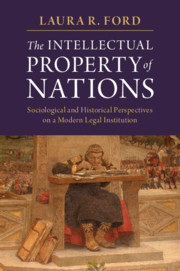 The Intellectual Property of Nations
The Intellectual Property of Nations Idealizing Roman Law
Published online by Cambridge University Press: 04 June 2021
This chapter focuses on the period of Roman history in which the empire emerged. The famous historical personalities of Caesar and Cicero are sketched to contrast two prevailing methods of acquiring social power in ancient Rome: charismatic leadership of soldiers, as exemplified by Caesar, and rhetorical persuasion in accordance with formalistic rules, as exemplified by Cicero. In one published speech by Cicero we see very close counterparts to intellectual property in ancient Rome: a situation in which a foreign-born poet has been granted Roman citizenship in order to reward his poetic services to the state, described metaphorically as property. We then see how this basic pattern of granting privileges in order to inventivize valued behaviors was systematically utilized by Roman emperors, as they sought to transform the institutional structures of the republic into an institutional structure over which they exercised more autocratic levels of control. Within the classical, imperial framework of Roman law, jurists recognized important forerunners to intellectual property. Many centuries later, these would become the foundation for modern intellectual property.
To save this book to your Kindle, first ensure [email protected] is added to your Approved Personal Document E-mail List under your Personal Document Settings on the Manage Your Content and Devices page of your Amazon account. Then enter the ‘name’ part of your Kindle email address below. Find out more about saving to your Kindle.
Note you can select to save to either the @free.kindle.com or @kindle.com variations. ‘@free.kindle.com’ emails are free but can only be saved to your device when it is connected to wi-fi. ‘@kindle.com’ emails can be delivered even when you are not connected to wi-fi, but note that service fees apply.
Find out more about the Kindle Personal Document Service.
To save content items to your account, please confirm that you agree to abide by our usage policies. If this is the first time you use this feature, you will be asked to authorise Cambridge Core to connect with your account. Find out more about saving content to Dropbox.
To save content items to your account, please confirm that you agree to abide by our usage policies. If this is the first time you use this feature, you will be asked to authorise Cambridge Core to connect with your account. Find out more about saving content to Google Drive.